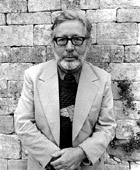Though many biographies say that Laurie Lee was born is Slad, his family seems to have moved there when he was three. This move affected him a lot and has been written about in great detail many many years later in Cider with Rosie "I was set down from the carrier's cart at the age of three; and there with a sense of bewilderment and terror my life in the village began.
The June grass, amongst which I stood, was taller than I was, and I wept. I had never been so close to grass before. It towered above me and all around me, each blade tattooed with tiger-skins of sunlight. It was knife-edged, dark, and a wicked green, thick as a forest and alive with grasshoppers that chirped and chattered and leapt though the air like monkeys. I was lost and didn't know where to move. A tropic heat oozed up from the ground, rank with sharp odours of roots and nettles. Snow-clouds of elder-blossom banked in the sky, showering upon me the fumes and flakes of their sweet and giddy suffocation. High overhead ran frenzied larks, screaming, as though the sky were tearing apart."
The autobiographical Cider with Rosie which is his most famous work, contains vivid records of his memories of his childhood in Slad before the arrival of the motorcar, including his school days. Laurie Lee studied at the village school and later went to Stroud Central School.
At fifteen he left school and became an errand-boy. Lee also gave lectures on the violin. When he was twenty he left Slad for London to earn his living.
He then spent four years travelling in Spain and the eastern Mediterranean. There he travelled on foot, playing his fiddle to earn his keep. Later, in December 1937, he joined the International Brigades to fight in the the Spanish Civil War, but after having a medical he was declared to be "physically weak" and was sent home.
His Spanish experiences resulted in the pre Civil War book As I walked Out One Midsummer Morning (1969) and the book considered by some to be his best work, A Moment of War (1991), a spare, unsentimental memoir of his experience as a volunteer in the Spanish Civil War.
Before devoting himself entirely to writing in 1951, Lee worked as a journalist and as a scriptwriter. In the Second World War he made documentary films for the General Post Office (1939-40), Crown Film Unit (1941-43)and the Ministry of Information (1944-46).
During the war he also worked for the Ministry of Information. From 1944 to 1946 he worked as an editor at the Ministry of Information Publications. From 1950 to 1951 he was caption-writer-in-chief for the Festival of Britain, for which service he was awarded the MBE in 1952.
His Cider with Rosie was an immediate best-seller, reaching a wide public with its images of village life from a bygone era of innocence and simplicity. With its success Lee could buy his childhood home in Slad.
His first love though, was always poetry though he was only moderately successful as a poet. His first poem Lee's first poem appeared in Horizon in 1940 and he published his first volume of poems, The Sun My Monument in 1944. This was followed by The Bloom of Candles (1947) and My Many Coated Man (1955). Several poems written in the early 1940s reflect the atmosphere of the war, but also capture the beauty of the English countryside.
Other works have included A Rose for Winter, about a trip he made to Andalusia 15 years after the Civil War, and Two Women (1983) was a story of Lee's courtship of his wife Cathy, and the birth and growth of their daughter Jessy.
Lee also wrote travel books, essays, a radio play, short stories. He received several awards, including the Atlantic Award (1944), Society of Authors travelling award (1951), M.B.E. (Member, Order of the British Empire), William Foyle Poetry Prize (1956), W.H. Smith and Son Award (1960).
Laurie Lee returned to Slad to live in his childhood home, with his wife Cathy in the early 1960s and remained until his death on May 14, 1997, at the age of 83. He is buried in the local churchyard. |






